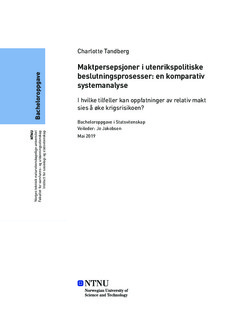| dc.contributor.advisor | Jakobsen, Jo | |
| dc.contributor.author | Tandberg, Charlotte | |
| dc.date.accessioned | 2019-09-06T14:11:47Z | |
| dc.date.available | 2019-09-06T14:11:47Z | |
| dc.date.issued | 2019 | |
| dc.identifier.uri | http://hdl.handle.net/11250/2613606 | |
| dc.description.abstract | Denne bacheloroppgavens tema er maktpersepsjoner i utenrikspolitiske beslutningsprosesser, og forskningsspørsmålet lyder slik: «I hvilke tilfeller kan oppfatninger av relativ makt sies å øke krigsrisikoen?». Videre er oppgaven utformet som en komparativ systemanalyse. For å besvare problemstillingen blir det henvist til to caser; maktpersepsjoner knyttet til Tysklands vekst frem mot første verdenskrig, og dagens oppfatninger av et maktmessig styrket Kina. Metodologisk sett bygger analysen på datasett og tall hentet fra Correlates of War, International Monetary Fund og Stockholm International Peace Research Institute, samt teori innenfor realismen, tidligere forskning, og historien i seg selv.
Det konkluderes på overordnet nivå med at krigsrisikoen kan sies å øke i de tilfeller der stater oppfatter sin relative maktposisjon i det internasjonale systemet som truet. På et mer spesifikt nivå konkluderes det med at krigsrisikoen i det tjueførste århundret antas å stige dersom USA oppfatter at Kinas maktøkning eller ekspanderende utenrikspolitiske interesser går på bekostning av deres egen relative makt og innflytelse. | |
| dc.description.abstract | The topic of this bachelor's thesis is perceptions of power in foreign policy decision-making, and the research question reads as follows: "In what cases can perceptions of relative power be said to increase the risk of war?". Furthermore, the thesis is designed as a comparative system analysis wherein two cases are referred to; power perceptions related to the growth of Germany towards the First World War, and the current perceptions of a power-enhanced China. Methodologically, the analysis is based on data sets and numbers obtained from Correlates of War, International Monetary Fund and Stockholm International Peace Research Institute, as well as theory within realism, previous research and history itself.
Generally, it is concluded that the risk of war increases in cases where states perceive their position in the international system as threatened. At a more specific level, it is concluded that the risk of war in the twenty-first century can be expected to rise if the U.S. perceives that China's increase in power or expanding ambitions is at the expense of their own relative power and influence. | |
| dc.language | nob | |
| dc.publisher | NTNU | |
| dc.title | Maktpersepsjoner i utenrikspolitiske beslutningsprosesser: en komparativ systemanalyse | |
| dc.type | Bachelor thesis | |
